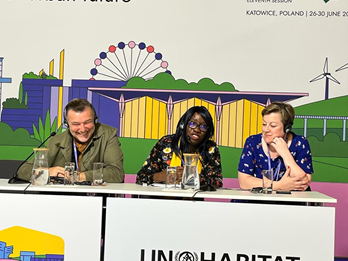 The UN Habitat World Urban Forum 11 (WUF11) was held in Katowice, Poland and was a gathering of the global urbanist community with an urgent challenge. According to the United Nations, there are around 3 million people moving to cities, many of them medium sized, every week. This equates to some 2.5 billion people more living in cities by 2050.
The UN Habitat World Urban Forum 11 (WUF11) was held in Katowice, Poland and was a gathering of the global urbanist community with an urgent challenge. According to the United Nations, there are around 3 million people moving to cities, many of them medium sized, every week. This equates to some 2.5 billion people more living in cities by 2050.
The patterns of migration, whilst disrupted by Covid 19, have not fundamentally changed and with existing and historic infrastructure under strain in many places and poor access to transit and decent housing, the unmanaged growth of cities is leading to sprawl and unmanaged development. The overwhelming message, particularly from the younger delegates, was the need for action which is a further challenge to planning as we know it.
What was clear was the reminder that only next door, with resonances far beyond the war in Ukraine, shockwaves are disrupting food supplies, local migration, and geopolitical balances. The planet, through communications and transport, has become much smaller and as a global family our problems and challenges are shared and urgent.
Within this the experience of being a professional planner has many commonalities as we work to protect health and wellbeing, respond to climate change, and ensure fair shares for all set against the urgent need for action. Our role as the general practitioners of the built environment is moving away from the traditional role of planner and more towards enabling communities to care for their places and each other.
The Role of Local Government
A strong theme at WUF11 was the crucial role of local government and municipal action and leadership. Local government must reach across national and regional borders and celebrate best practice. This message was clear and a validation of the key role of local leadership and innovation, join this innovation up and perhaps the scale and pace needed will be achieved.
Global gathering such as WUF11 have the role of connecting key professionals, city leaders and NGOs to take messages such as this back to their own contexts. Planners in local government irrespective of planning systems and the stage on the development curve appear to be working in very similar spaces and with shared challenges of resourcing, communication with communities, mediating and managing private interest and public goods, protecting the environment and delivering decent homes for the essential workforce that support city.
As the chair of the Global Planners Network (GPN), I was honoured and delighted to represent planners who are working hard, often in difficult circumstances, to make the world a better place.
Impact
Having a presence at WUF11 was an important opportunity for the RTPI as a global Institute with healthy partnerships with the American Planning Association, the Commonwealth Association of Planners, and many others.
With active members of the RTPI contributing to the Habitat Professionals Forum and as the Chair and Secretariat of the GPN WUF11 was an ideal opportunity to share our thought leadership and convening power. With bilateral meetings with our friends at ISOCARP and IFLA the Polish Planning Institute amongst others we were also delighted to co-host through the GPN a Networking Event at WUF11 reaching a global audience.
Our event was in contrast to many at WUF11 as we kept the talk and the panel to a minimum and handed over the mic to the audience who came from a wide variety of global contexts, unsurprisingly the main themes of housing, climate change, health and equity were raised as urgent additions and updates to the New Urban Agenda but also more fundamental issues such as human rights and the role of the built environment as an enabler.
With fantastic feedback our joint RTPI /GPN / ISOCARP was in the spirit of engagement and co-production and I was proud to have not only helped to deliver great content, but also a great process. A report of the event will be published on the GPN website shortly.
Final Thought
Just after our Networking Event I attended the Scottish Government event based on NPF4, community planning and the ambitions of Edinburgh City Council. Across three scales from national to local the presentation covered many of the big themes and questions posed by WUF11 – if delivered upfront and early in the conference there would have been much to learn from the role of strategic planning alongside community led approaches, sometimes learning is close to home.
And in other news… my 1000th LinkedIn connection was none other than Angela Brooks of the APA – what a privilege to part of a global community of professional planners – delighted to connect Angela!


